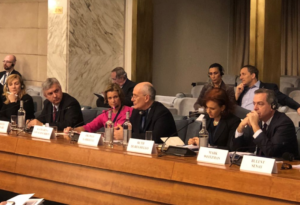ROME INTERNATIONAL CONFERENCE ON FIGHTING ANTI-SEMITISM IN THE OSCE AREA Against Hatred, European Legislators Must Act Together
What responsibility do lawmakers and authorites have in the fight against anti-Semitism? What could we do to be more effective in this fight that involves all European countries? These are some of the issues that were discussed in the panel “Responsibility: the role of law makers and civil servants” in Rome, during the conference on the fight against anti-Semitism in OSCE countries.
“We have to define anti-Semitism to be able to fight it. You cannot fight it if you don’t know what it is”, said Katharina von Schnurbein, Special Coordinator of the EU commission against anti-Semitism. She also highlighted the necessity for all EU countries to adopt the definition of anti-Semitism provided by the IHRA, an intergovernmental organization for Remembrance.
Ambassador Sandro de Bernardin, who will chair the IHRA from next March, emphasised that it is important to know how widespread anti-Semitism is. Statistics are fundamental, but they are not enough. “We have to work hard to erase anti-Semitism completely, and to do so, we have to make local authorities feel responsible”.
The Chief of Italian Police, Franco Gabrielli, focused on the statistics on anti-Semitism in Italy. “Today’s topic is a cultural topic that concerns the safeguard of Judaism. Since 2010, Italy has had a Monitoring centre on safety against hate crimes (OSCAD). According to the data from the last 7 years, 60 per cent of reported hate crimes with a religious motive are anti-Semitic. Particularly in the last 3 years, reports of anti-Semitic hate crimes have decreased, while more people are being charged and arrested”, Mr. Gabrielli explained. “The close relationship between the Jewish community and the Police in Italy allows the community to live in the best conditions. When members of the community come to our offices, they are not wary. Rather, they are sure they will find an institution able to fight anti-Semitism”, declared Mr. Gabrielli.
Later, Ruth Dureghello, president of the Jewish community in Rome, said: “The situation for Jews in Italy, especially in Rome, is more favourable than in many other countries. But there still are alarming signs, with returning symbols from the past and rising anti-Semitism even in academia”. Even some measures taken by the judging authorities cause worries. Mrs. Dureghello mentioned especially a verdict that judged a “Jew” chant during a football match “a fans’ thing”.
Later, Raya Kalenova, Executive Vice President of the European Jewish Congress, also discussed the role of the law. “The role of lawmaking is not to control people’s thoughts or opinions”, she said. “But to prevent anti-Semitism, prejudice and hate from spreading, in order to make it clear that such behaviours attack our values and our societies”.
Translated by Federica Alabiso, student at the Advanced School for Interpreters and Translators of Trieste University, intern at the newspaper office of the Union of the Italian Jewish Communities.

